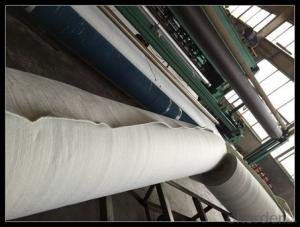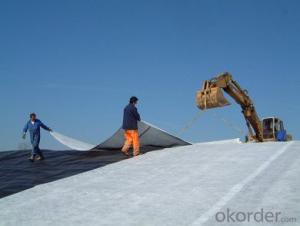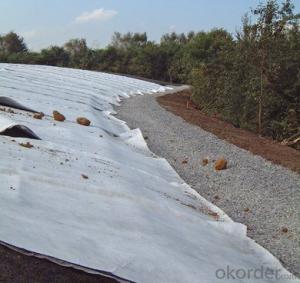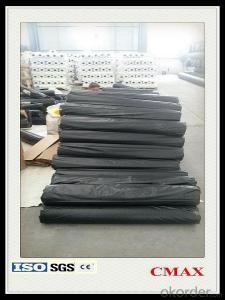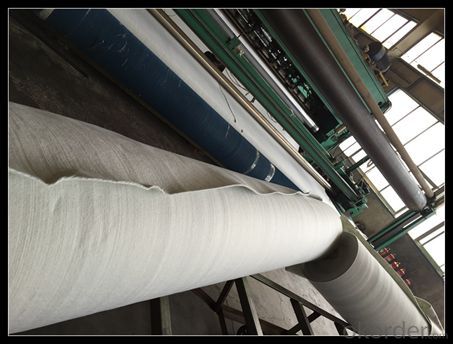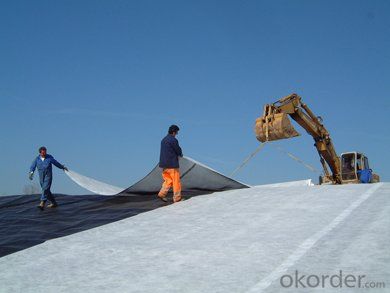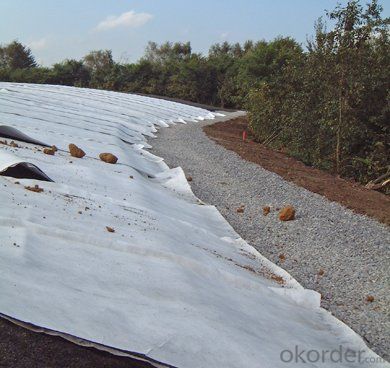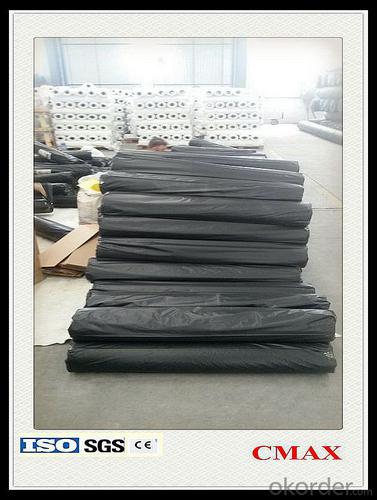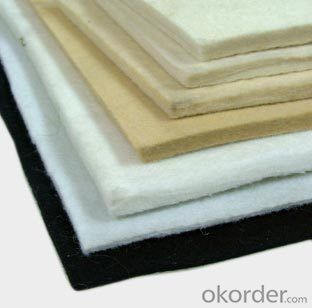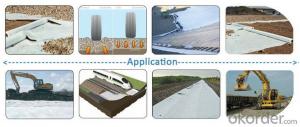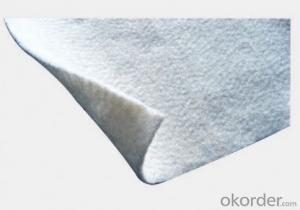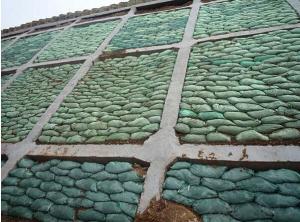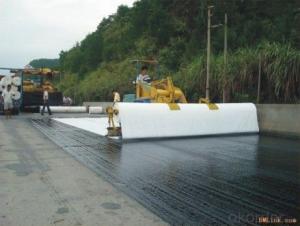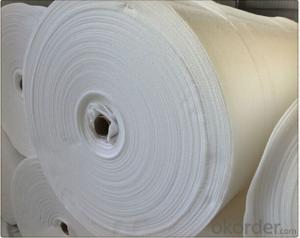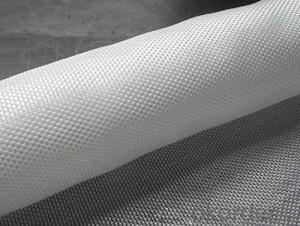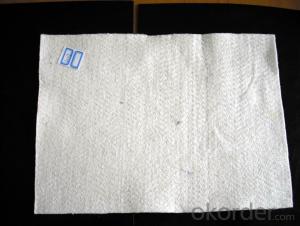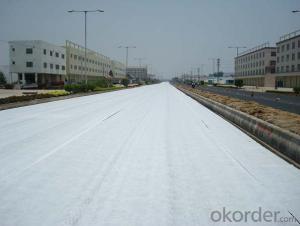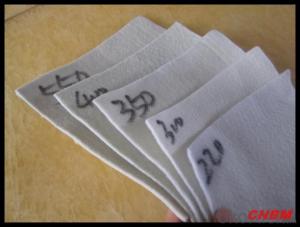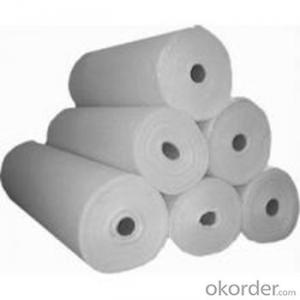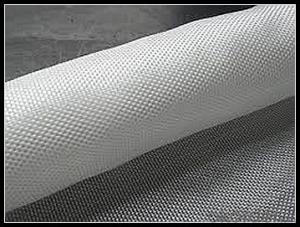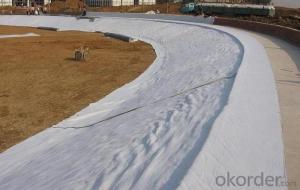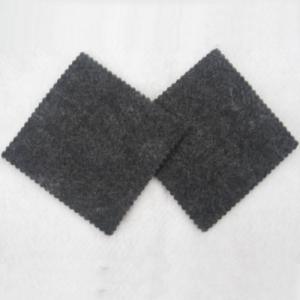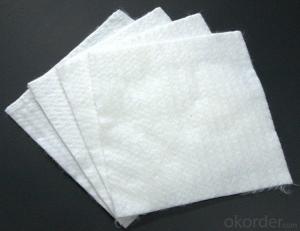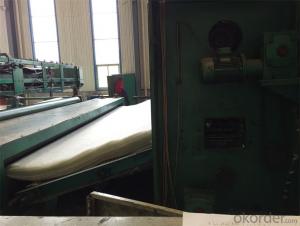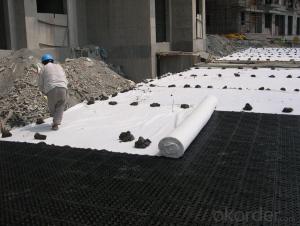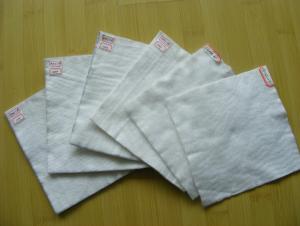Aashto M288 Class 2 Geotextile - Short Nonwoven High Strength Polyester Fabric Materials
- Loading Port:
- China main port
- Payment Terms:
- TT OR LC
- Min Order Qty:
- 1000 m²
- Supply Capability:
- 100000 m²/month
OKorder Service Pledge
OKorder Financial Service
You Might Also Like
Specification
Separation
CNBM Geotextile acts as a separator between two layers of soil that have different particle size distributions. CNBM Geotextiles are used to prevent road base materials from penetrating into soft underlying sub grade soils, thus maintaining design thickness and roadway integrity. Separators also help to prevent fine-grained sub grade soils from being pumped into permeable granular road bases.
Filtration
CNBM Geotextile acts similar to a sand filter by allowing water to move through the soil while retaining all upstream soil particles. CNBM Geotextiles are used to prevent soils from migrating into drainage aggregate or pipes while maintaining flow through the system. TexoFib Geotextiles are also used below rip rap and other armour materials in coastal and river bank protection systems to prevent soil erosion.
filtration
Benefits
High soil confinement for greater load distribution
Durable and superior damage resistant
High modulus, for immediate structural support
Unique weave optimizing both strength and filtration properties
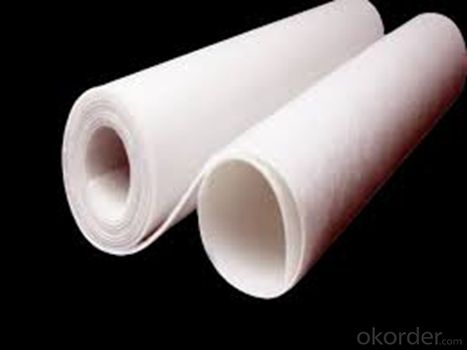
Packaging & Shipping
Packing: PLASTIC FILM INSIDE, AND WOVEN BAG OUTSIDE
Shipping: About 15 days after receipt the deposit
specifications
geotextile fabric
permeability,filtration,easy for construction
ISO and CE certificate
Good quality and competitive price
Our Service
Quality assurance
1.On a regular basis or as per your request,we entrust national testing agencies to conduct quality inspections
2. Strictly in accordance with the ISO9001-2008 international quality system standard,we monitor and manage the whole process throughout production,quality testing,and measurement to ensure product quality
3. For quality-related construction delay or substandard construction(except for damage or losses due to customer’s responsibility or irresistible natural disasters),we have refunding,replacement,and repair services.We will respond to customers’ feedbacks on quality issues within 24 hours.
FAQ:
Q: What kind of payments does jenor support?
A: T/T, L/C, Cash are accepted.
Q: Do you charge for the samples?
A: Accordeing to our company policy, the samples are free, we only charge the freight fee. And we will return the freight fee during the next order.
Q: Can you produce according to customers' design?
A: Sure, we are professional manufacturer, OEM and ODM are both welcome.
Q: Do you have other products?
A: Yes, please check the pictures:
- Q: What are the applications of geotextiles in geotechnical engineering?
- Geotextiles have a wide range of applications in geotechnical engineering. They are commonly used for soil stabilization, erosion control, and drainage systems. Geotextiles can be used to reinforce soil, preventing slope failures and improving the stability of embankments and retaining walls. They also serve as a barrier against soil erosion by maintaining the integrity of the soil structure. In addition, geotextiles are used for filtration and separation purposes, allowing water to pass through while preventing the movement of fine particles. Overall, geotextiles play a crucial role in enhancing the performance and longevity of various geotechnical structures.
- Q: Are geotextiles suitable for use in geogrid reinforced slopes?
- Yes, geotextiles are suitable for use in geogrid reinforced slopes. Geotextiles can provide separation, filtration, and erosion control functions, which are essential for maintaining the stability and performance of geogrid reinforced slopes.
- Q: Can geotextiles be used in landfill lining systems?
- Yes, geotextiles can be used in landfill lining systems. Geotextiles are commonly employed as part of the composite liner system to prevent leachate seepage and provide reinforcement. They can act as a barrier between the waste and the soil, reducing the potential for contamination and enhancing the overall performance of the landfill lining system.
- Q: Can geotextiles be used in landscaping projects?
- Yes, geotextiles can be used in landscaping projects. Geotextiles are often used as an effective way to control erosion, stabilize soil, and separate different layers of soil or aggregates in landscaping applications. They can be used for retaining walls, slope stabilization, weed control, and drainage systems, among other purposes.
- Q: How do geotextiles help with reinforcement of geotextile bags?
- Geotextiles help with the reinforcement of geotextile bags by providing added strength and stability to the bags. They act as a barrier between the soil and the bag, preventing soil erosion and maintaining the shape and integrity of the bags. Geotextiles also distribute loads evenly across the bag's surface, reducing the stress on the bag and enhancing its overall performance in reinforcement applications.
- Q: What are the factors affecting the performance of geotextiles?
- There are several factors that can affect the performance of geotextiles, including the type and quality of the material used, the installation and maintenance techniques employed, the environmental conditions such as temperature and moisture levels, the load and stress placed on the geotextile, and the compatibility with adjacent materials. Additionally, factors such as UV exposure, chemical resistance, and long-term durability can also impact the performance of geotextiles.
- Q: How do geotextiles contribute to pavement performance?
- Geotextiles contribute to pavement performance by providing reinforcement, filtration, and separation functions. They enhance the structural integrity of the pavement by distributing loads and reducing the potential for cracking and rutting. Geotextiles also help in preventing the mixing of different layers of pavement materials, improving drainage, and reducing the intrusion of fine particles into the pavement layers. Overall, geotextiles improve the durability, longevity, and overall performance of pavements.
- Q: What are the experiments required for earthwork dam geotextiles
- The first thing to do is the "unit area quality" and "thickness", followed by "breaking strength", breaking elongation "," CBR broken strength ", and tear strength. Huazhi geotextile for your answer
- Q: Production of acupuncture carpets, geotextiles, warm flakes, paper blankets, air filter materials, the main raw material is what? why?
- Fiber, like eating bread must be the same with the face
- Q: Geotextile filter layer set which quota
- Filter cloth, monofilament filter cloth, polypropylene filter cloth, nylon green monofilament
Send your message to us
Aashto M288 Class 2 Geotextile - Short Nonwoven High Strength Polyester Fabric Materials
- Loading Port:
- China main port
- Payment Terms:
- TT OR LC
- Min Order Qty:
- 1000 m²
- Supply Capability:
- 100000 m²/month
OKorder Service Pledge
OKorder Financial Service
Similar products
Hot products
Hot Searches
Related keywords
